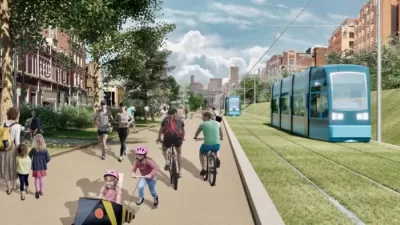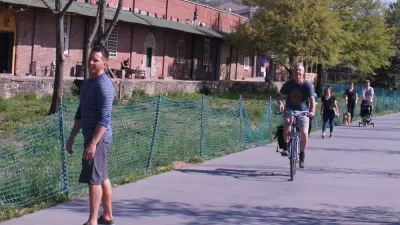The first phase of the Atlanta Streetcar is open to the public, though the city has big plans to extend the line. One planning academic hopes to redirect the planning process.
Mike Dobbins, professor of the practice of planning at Georgia Tech’s College of Architecture and a former commissioner of planning and community development for the city of Atlanta, reviews the planning and political decisions behind the Atlanta Streetcar. In December, the Atlanta City Council approved an extension of the existing streetcar route, including 22 miles of streetcar track running alongside the BeltLine.
Dobbins's review is a critical one, summarized by the following: "While the old railroad segments that make up the BeltLine make a lot of sense for a park and trail system, they are not a solution for the city’s transit problems…" After laying out what a comprehensive transit planning exercise would look like, Dobbins makes the following recommendation:
While a lot of time, money, and effort has gone into trying to make the “solution” fit the problem, with a successful referendum it is not too late to redirect the city’s efforts to catch up with commonsense transit planning. The Legislature last month enabled Atlanta to put forward a referendum in November 2016 or 2017 for a proposed half-percent increase in the city’s sales tax to raise $2.5 billion for transit construction.
According to Dobbins, reborn legislation that would allow Atlanta voters to decide on a half-cent transit tax offers a new chance to start holistic transit planning process.
FULL STORY: Transit Planning 101 for the City of Atlanta: It’s not too late

Planetizen Federal Action Tracker
A weekly monitor of how Trump’s orders and actions are impacting planners and planning in America.

Maui's Vacation Rental Debate Turns Ugly
Verbal attacks, misinformation campaigns and fistfights plague a high-stakes debate to convert thousands of vacation rentals into long-term housing.

Restaurant Patios Were a Pandemic Win — Why Were They so Hard to Keep?
Social distancing requirements and changes in travel patterns prompted cities to pilot new uses for street and sidewalk space. Then it got complicated.

In California Battle of Housing vs. Environment, Housing Just Won
A new state law significantly limits the power of CEQA, an environmental review law that served as a powerful tool for blocking new development.

Boulder Eliminates Parking Minimums Citywide
Officials estimate the cost of building a single underground parking space at up to $100,000.

Orange County, Florida Adopts Largest US “Sprawl Repair” Code
The ‘Orange Code’ seeks to rectify decades of sprawl-inducing, car-oriented development.
Urban Design for Planners 1: Software Tools
This six-course series explores essential urban design concepts using open source software and equips planners with the tools they need to participate fully in the urban design process.
Planning for Universal Design
Learn the tools for implementing Universal Design in planning regulations.
Heyer Gruel & Associates PA
JM Goldson LLC
Custer County Colorado
City of Camden Redevelopment Agency
City of Astoria
Transportation Research & Education Center (TREC) at Portland State University
Jefferson Parish Government
Camden Redevelopment Agency
City of Claremont





























